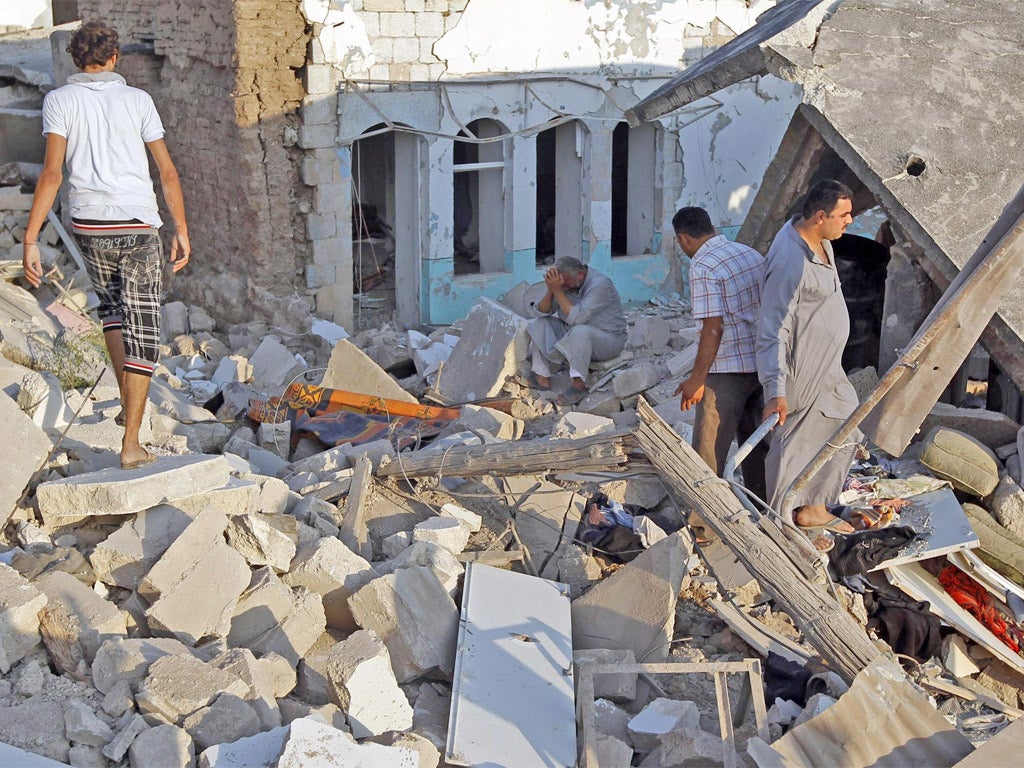Kidnappings bring Syria's civil war to Lebanon
Foreigners told to leave Beirut after UN report accuses the Assad regime of war crimes

Masked men armed with assault rifles gathered in Beirut's southern suburbs yesterday to announce that they had taken dozens of Syrians hostage and threatened to kidnap Gulf nationals, as the sectarian spill over from the conflict took a sinister new twist in Syria's smaller neighbour.
Members of a powerful Shia clan warned of further "escalation" after taking the men hostage in the Lebanese capital in retaliation for the kidnapping of a family member across the border by rebels opposed to President Bashar al-Assad's regime.
The new crisis came as the UN said that its investigation into the Houla massacre had found that troops loyal to Assad were responsible for war crimes and crimes against humanity.
"On the basis of available evidence, the commission concluded that the elements of the war crime of murder have been met," said the report by a panel appointed by the UN's Human Rights Council. It also said the rebel forces had committed war crimes during the conflict, but on a smaller scale.
Yesterday Saudi Arabia, Qatar and the UAE ordered their citizens to leave Beirut immediately, saying reprisals may be taken against their nationals, who have strongly supported the Syrian opposition.
At least one plane was diverted from Beirut airport as hundreds of protesters, some armed, blocked the highway out of the city with burning tyres.
The mass kidnappings came after Hassan Meqdad was abducted by rebels in Syria and shown, blackened and bruised, admitting to being a sniper sent from Lebanon by Hezbollah leader Hassan Nasrallah in a video posted online. His family has denied he is a member of the group.
Yesterday morning, the hostage's brother Hatem announced that more than 20 Syrians travelling on two minibuses had been abducted by the family and would not be released until their kinsman is returned. However, the count rose throughout the day, with some reports putting the total at more than three dozen – including a Saudi Arabian and a Turkish national.
Hatem Meqdad said that the Lebanese Foreign Minister, Adnan Mansour, had called him to ask for the release of the Turkish citizen. “Mansour talked to me for three minutes… he asked me to release the Turkish abductee but I told him I was not ready to even give him the shoe of the abductee before my brother returns,” Mr Meqdad told the National News Agency.
Inflaming tensions was the reported death of four of 11 Lebanese Shia abducted last month as Assad regime airstrikes hit the northern Syrian city of Azaz where they were being held, killing at least 30 people. Photographs showed areas of the town – near the Turkish border – flattened by the bombing, with blackened bodies pulled from the rubble.
Members of the dead men's families – who claim they were simply pilgrims visiting a shrine in Syria – were among those who joined the protest on the airport road, according to witnesses.
The tensions in Lebanon, whose politics and religion are intricately linked with that of Syria, come as the conflict there becomes increasingly sectarian. The flames have been fanned by a proxy battle between Sunni Arab states – led by Saudi Arabia and Qatar – who back the opposition on the one hand, and the Syrian Alawite regime, backed by Iran and the Lebanese Shia militia Hezbollah.
The US has accused Iran of training militias to fight for the regime, a belief widely held by rebels, which has fuelled the sectarian kidnappings. The Iranian embassy came under attack by opposition forces yesterday as a fuel tanker exploded in a car park yards from a hotel where UN observers are staying. There was confusion over who was responsible, with conflicting claims from within the Free Syrian Army (FSA).
Join our commenting forum
Join thought-provoking conversations, follow other Independent readers and see their replies
Comments
Bookmark popover
Removed from bookmarks